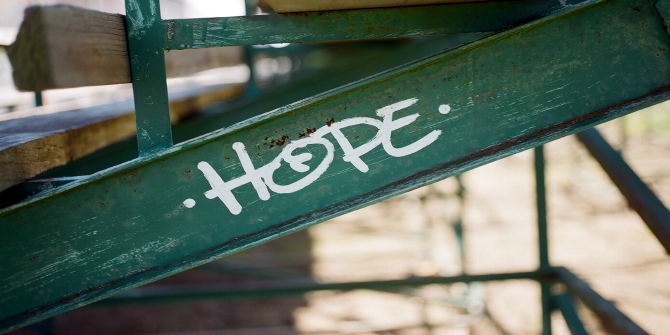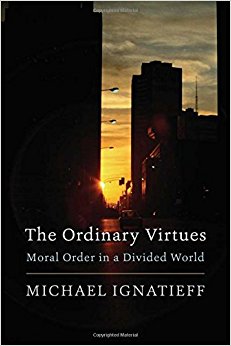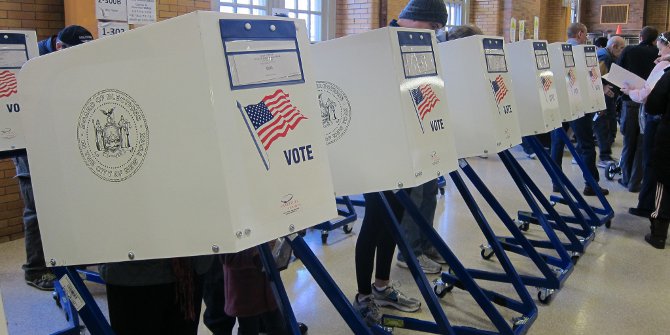In The Ordinary Virtues: Moral Order in a Divided World, Michael Ignatieff aims to take ethics out of the seminar room by examining the role of ‘ordinary virtues’ such as trust, forgiveness and reconciliation in local contexts and settings. While the book travels the globe to underscore both the fragility and strength of community-based networks of solidarity as part of Ignatieff’s broader commitment to political liberalism, the challenges of today may require more than faith in the ‘ordinary virtues’ of individuals, writes Joshua Smeltzer.
The Ordinary Virtues: Moral Order in a Divided World. Michael Ignatieff. Harvard University Press. 2017.
The morning after the largest mass shooting by an individual in US history, committed on 1 October 2017, people queued at Red Cross centres in Las Vegas to donate blood and help strangers. There was no way to turn back the clock and save the lives of over fifty victims, but their act of generosity pointed to a simple message – even an extreme act of barbarism would be met with the kindness of ordinary people.
Such stories of human decency form the core of Michael Ignatieff’s sprawling project, The Ordinary Virtues: Moral Order in a Divided World, initially conceived as part of the centennial of Andrew Carnegie’s endowment of the Carnegie Council for Ethics in International Affairs. Ordinary Virtues is based on the idea that ‘the Council needed to take ethics out of the seminar room and study how it shapes people’s judgments and actions close to the ground where conflicts start’ (3). This meant engaging in a form of ethics tourism, offering a snapshot into the meaning of ordinary virtues in diverse locations such as Rio de Janeiro, Bosnia and Los Angeles. Each place forms a separate chapter in the book and illuminates a specific aspect of ordinary virtues, ranging from corruption and public trust to reconciliation after periods of intense conflict. As Ignatieff quips, to understand ethics, ‘you need to get out of New York’ (3) – or, perhaps more specifically out of Manhattan, as the first chapter is set in Queens.
In each location, Ignatieff finds a common emphasis on what he describes as ‘ordinary virtues’: everyday traits such as trust, tolerance, forgiveness and reconciliation. These are not the result of abstract moral reasoning, but are rather ‘unreflexive and unthinking’. Indeed, across the world, Ignatieff finds that ‘generalities about human obligation and moral reasoning [mean] little’; instead, ‘context was all’ (26-27). While philosophers might think in terms of ‘the human race, some abstract standard, beyond the veil of ignorance’ (208), ordinary people think through moral situations in terms of concrete human relations with their family and friends. For the people in Ignatieff’s narrative, what mattered was ‘how they would look to these local audiences and to themselves’ (208). Doing the right thing could only be illuminated by the highly context-dependent ‘moral operating system’ of their community (28).
 Image Credit: (Steve Snodgrass CC BY 2.0)
Image Credit: (Steve Snodgrass CC BY 2.0)
In his chapter discussing the events surrounding the nuclear reactor meltdown in Fukushima, however, Ignatieff’s description of virtuous action transcends the ordinary into the realm of the supererogatory. There, he recounts the efforts of the eleven core staff members at the plant, who ‘in darkness, with no electric power, cut off from their families and the rest of the world’ put their lives on the line to mitigate the impacts of the accident (150). Faced with an extreme circumstance, these men acted with resilience: ‘people in extreme situations do not always panic; they do not desert their posts, betray their colleagues, abandon their suffering. Instead, they seek to do their best in impossible situations’ (151). For Ignatieff, such a regard for the safety of others is firmly rooted in our ‘hope in the future of such a community’, and ‘depends on some shared belief in a collective future worth fighting for’ (165).
One of the recurring themes of Ignatieff’s journey across the globe was the refrain that ‘virtue was local’, meaning that ‘we are always in a particular situation, a context, a moment […] and we are always with others, with people whose opinion shapes us and whose views we wish to shape’ (209). In such a local approach focused on the actions of individuals within a community, the language of human rights has little purchase: as Ignatieff argues, ‘the human rights revolution has changed what we believe about the duty of states. I doubt it has changed us’ (216). For Ignatieff, the value of human rights discourses is only to force us to extend our moral gaze beyond the immediate community, beyond ‘the exclusionary and restrictive preference of ‘‘us’’ versus ‘‘them’” (214). However, it is ordinary virtues that can function as a basis for solidarity, offering a moment of hope for distraught communities.
And yet, Ignatieff is careful to note that the power of ordinary virtues is fragile. A sense of moral community ‘is a precarious achievement, an unending experiment that violence could destroy at any moment’ (72). All it takes is a moment of ‘extraordinary vices’ to make us question the goodwill of our neighbours. However, while ordinary virtues might be ‘helpless in the face of barbarism’ – here, Ignatieff specifically mentions the attacks in Paris in November 2015 – ordinary virtues re-emerge after tragedy. In Paris, ordinary virtue meant ‘an inchoate, unformulated, but stubborn commitment to live together again’ (221): it was the reassertion of community and an articulation of resilience.
While much of Ignatieff’s analysis focuses on the virtue of individuals or groups within a larger community, institutions still play a role in encouraging the development of virtue. Political institutions, ‘when supported by citizens of virtue, can stop the elites’ downward spiral into predatory self-dealing. Good institutions can give courage to virtue and inspire an upward spiral toward repair and renewal’ (30). As Ignatieff notes: ‘the whole point of a liberal society is to create laws and institutions that make virtue ordinary. In a decent society, love should not require anyone to be a hero’ (195).
Indeed, Ignatieff’s commitment to liberal freedom, following in the footsteps of his former mentor Isaiah Berlin, means political institutions exist to allow ‘ordinary virtues to flourish’ (191), virtues which were already inherent to individuals in all of their diverse forms. This belief in essential human goodness allows for the state to recede entirely into the background, stripped of any positive functions it may have. While critiquing the ability of states – and particularly the welfare state – to predict the unimaginable, Ignatieff notes ‘instead of embracing the future, imagining radiant tomorrows, we now think of the future in the language of harm reduction, target hardening, and risk management’ (143). Ultimately, he is correct in lamenting the lack of imagination or creative potential in contemporary politics, which has largely abandoned the idea of the state as a catalyst for change; however, by placing so much weight on the role of individuals at the expense of the state within the context of a broader commitment to political liberalism, Ignatieff himself betrays the very same lack of imagination he criticises. For while Ignatieff reminds us chapter after chapter of the ordinary virtues of people across the world, it will take much more than individuals to restore faith in the possibility of ‘radiant tomorrows’.
This review originally appeared at the LSE Review of Books.
Please read our comments policy before commenting.
Note: This article gives the views of the authors, and not the position of USAPP– American Politics and Policy, nor of the London School of Economics.
Shortened URL for this post: http://bit.ly/2zLrcJ7
——————————————–
About the reviewer
Joshua Smeltzer – University of Cambridge
Joshua Smeltzer is a doctoral student at the University of Cambridge pursuing a PhD in Politics and International Studies, with a focus on twentieth-century German Political Thought. Read more by Joshua Smeltzer.


 Find this book:
Find this book: 



